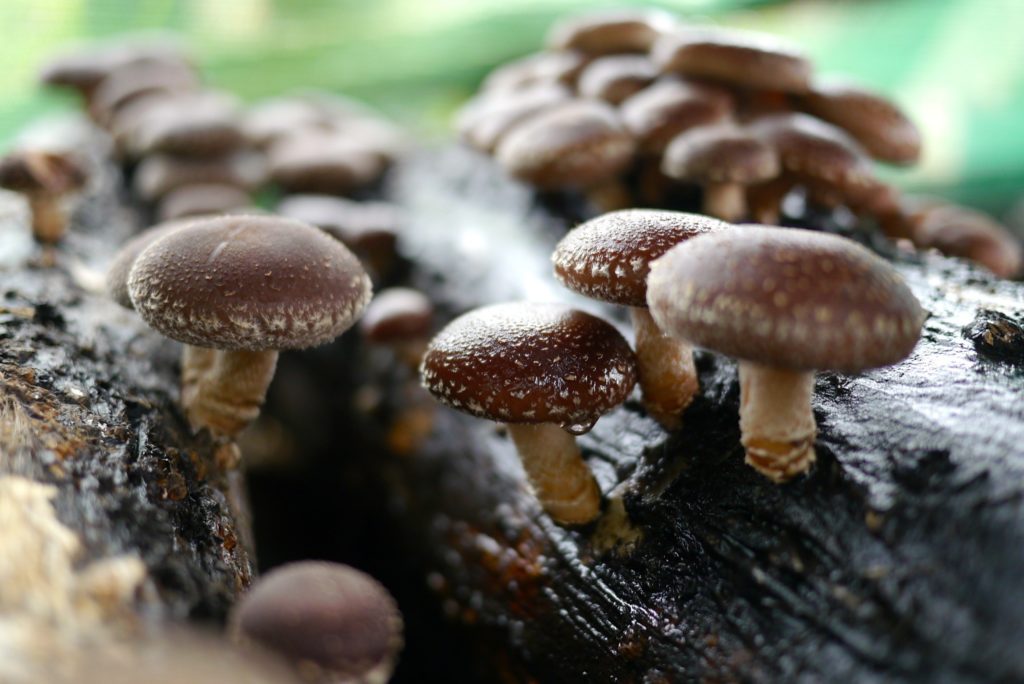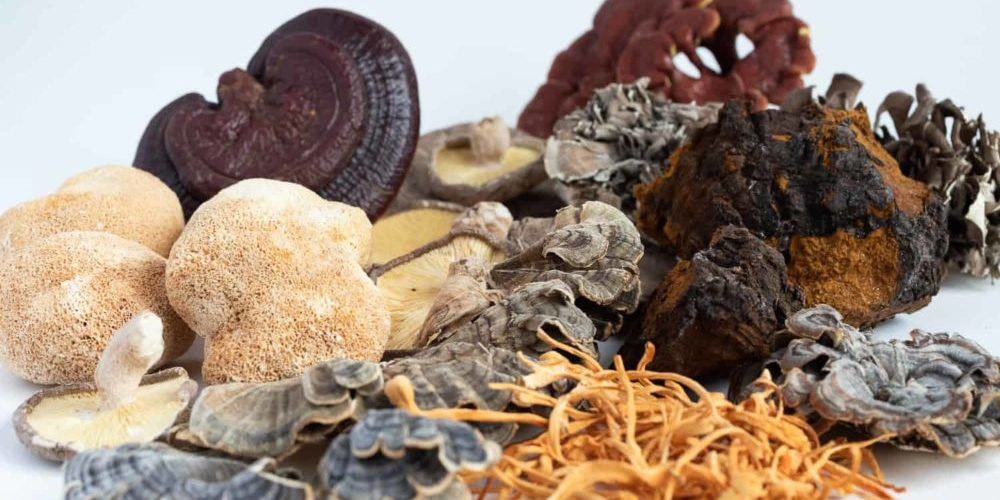Lentinula edodes is commonly known as the shiitake mushroom and is an edible mushroom that is native to East Asia. While commonly found in Japan and China, this mushroom is cultivated across Asia. It is an exotic mushroom well known for its rich taste and is used in a variety of forms and recipes across the world.
In Asia, Lentinula edodes has been used for thousands of years to promote and improve good health. It is the second-largest cultivated mushroom in the world and the most popular edible mushroom. In China, Lentinula edodes is known as Xianggu and Shiitake in Japan. The name shiitake comes from shii-, for the Japanese tree chinquapin (upon which it grows) and, -take refers to mushroom. The species name edodes translates as edible in Latin. High-grade shiitake mushrooms may also be called Donko in Japanese.
Lentinula edodes was first described in 1877 by mycologist Miles Joseph Berkeley and since then has been given several scientific names. In addition, it is known as sawtooth oak mushroom, oakwood mushroom, golden oak mushroom, black forest mushroom and black mushroom. It is thought that this mushroom may have first been cultivated as long ago as 1000AD, in China and is still a highly sought-after mushroom in traditional medicine.
Lentinula edodes starts its lifecycle as a network of invisible mycelium that feeds from dead wood it extracts nutrients from the fallen wood to develop and grow its fruiting body - the mushroom itself.

My name is Austin Collins.
I've dedicated my life to Mushrooms.
I believe Mushrooms are the best kept secret when it comes to health and well being.
For that reason, I would like to share a company with you that in my opinion makes the best mushroom products on the market.
The company is called Noomadic Herbals, my favorite supplement they make is called "Mushroom Total".
I take their products every day and they have helped me think better and have more energy. Give them a try.
-Austin
Lentinula edodes Identification and Description
Cap: Large and tan to dark brown caps; umbrella-shaped with rolling edges. The fruiting body needs more light and humidity than the mycelia. 5 – 12cm in diameter.
Gills: Cream.
Stem: Whitish to cream-colored and slender; may turn brown with maturity. Grows to 5-8cm in height.
Smell: Dried it is sometimes described as sulphurous or unpleasant.
Taste: Strong, rich and earthy when fresh also described as meaty; rich and smokey when dried.
Spore color: White.
Edibility: The mushroom is edible and widely used for culinary and medicinal purposes.
Habitat: Grows on decaying woods of deciduous trees, especially shii, oak, chestnut, beech, maple, sweetgum, poplar, alder, hornbeam, ironwood, chinquapin and mulberry; enjoys warm and dry to moist climates, not wet. Grows in groups and is found fruiting during the spring and autumn months.
Phylum: Basidiomycota; Class: Agaricomycetes; Order: Agaricales; Family: Omphalotaceae; Genus: Lentinula and Species: edodes.
Lentinula edodes Benefits
Lentinula edodes is low in fat overall but high in polyunsaturated fatty acids. It is a good source of carbohydrates, protein and essential amino acids. Lentinula edodes also contains many vitamins and minerals including copper, zinc, selenium, iron, vitamin B-complex, vitamin C and vitamin D.
The proteins in Lentinula edodes are made up of 18 different types of amino acids, including all essential amino acids. These are found in ratios that are similar to human nutritional requirements [1.] making Lentinula edodes an ideal dietary supplement for those with protein-limited diets.
Immune boosting
When lentinan, an extract taken from Lentinula edodes, was given to rats as a daily nutritional supplement, the rats saw an increase in circulating white blood cells; these cells are essential for fighting infections. In addition, there was a reduction in molecules associated with inflammation. This demonstrates a potential role for Lentinula edodes in boosting the immune system [2.]. Other studies have also provided supporting evidence in the role of this mushroom in enhancing the immune defenses.
Antimicrobial (bacterial, fungal and yeast)
Antibiotic resistance by microbes has become an evolving problem with researchers looking to exploit natural products to reinforce the fight against pathogens. Extracts from supermarket-bought Lentinula edodes were tested against a panel of different bacteria, yeast and fungal pathogens and it showed positive antimicrobial against 85% of those it was tested against. Of significance was the positive effects of Lentinula edodes against strains of Pseudomonas and Salmonella bacteria [3.], a good response was also seen against Staphylococcus aureus (MRSA). MRSA is a significant problem seen in hospital environments.
Anti-Cancer
The anti-tumor effects of Lentinula edodes have been observed in several cancers; some studies have been described below. There have been positive reports for breast cancer also; however, the reported effects on pancreatic cancer have been varied.
Colon Cancer
Lentinan is thought to be one of the major bio-active molecules in the Lentula edodes. The effects of the extract were observed on human colon cancer cells in mice pre-fed with lentinan and a significant reduction in the size of tumor formation was observed in mice that were pre-fed compared to controls [4.].
Gastric cancer
An analysis of patients with gastric cancer, receiving immunochemotherapy in addition to lentinan (the Lentinula edodes extract) was performed. The results showed that patients receiving conventional therapy in addition to lentinan had a more prolonged survival rate. It was also noted that the results might be more effective in patients with lymph node metastasis (cancer spread to the lymph node) when compared to non-lymph node metastasis [5.].
Pancreatic cancer
Twenty-five patients with advanced pancreatic cancer were administered lentinan, and survival times were examined based on a three year follow up. 20% of patients (5 out of 25) survived the 3 years, although the median was 12.1 months. There was also a significant relationship between quality of life and lentinan treatment [6.]. The evidence is in support of quality of life-enhancement in patients administered compounds extracted from Lentinula edodes.
Liver Protection
Liver fibrogenesis is a wound healing process following chronic liver damage, and it can occur following hepatitis viral infection. Too much liver fibrogenesis can lead to unwanted liver cirrhosis. A mouse model representing liver damage showed extracts of Lentinula edodes was able to reduce the fibril forming process. In addition, in vitro, rat liver cells showed that the extract provided protection, in particular through the specific liver cells – hepatic stellate cells, that are involved in liver fibrosis. The authors confirmed the potential for using Lentinula edodes as a safe liver protective agent with few side effects [7.]. Furthermore, in humans with hepatocellular carcinoma, the most common type of liver cancer, long-term ingestions of a food supplement with Lentula edodes was shown to increase survival rates in patients [8.].
Bone inducing
An in vitro study of bone cells clearly showed that the activity of Lentinula edodes in culture acts as a bone inducing agent. Therefore, this mushroom deserves attention and further research in its use as a supportive dietary treatment for conditions associated with bone disease including, osteoporosis (a brittle bone disease) and bone complications with late-stage diabetes [9.].
High blood pressure
Research involving a model of hypertensive rats showed that 5% of Lentinula edodes extract for 9 weeks was able to reduce blood pressure levels [10.]. These effects do need to be also confirmed in human patients with high blood pressure.
Anti-Diabetes
Using a rat model to mimic diabetes, extracts taken from a mycelial culture of Lentinula edodes were able to reduce plasma glucose levels by as much as 21%. In addition, those rats receiving Lentinula edodes had increased insulin levels of 22% compared to the controls; insulin is essential for controlling glucose levels. Importantly, plasma levels of total cholesterol and triglycerides were reduced by 25% and 44% respectively. The dose of Lentinula edodes administered to the rats was 200mg/kg of body weight [11.] and shows potential as an agent to control blood glucose, fatty acids and cholesterol levels.
Anti-Cold and Flu
Lentinus edodes is full of beta-glucans, compounds that have been shown to act as antivirals – against hepatitis, HIV and herpes, to name a few. Studies have shown that in vitro extracts of Lentinula edodes can also prevent influenza (flu) virus growing during the early stages of infection. The possible mechanisms of action include the prevention of entry into the host cell by the virus. Gaining entry to the host cell is essential for the flu virus to be able to reproduce itself and then continue to infect others. This warrants more considerable research, particularly during times such as now with the recent pandemic. Furthermore, the administration of Lentinula edodes by the nose into an infected mouse increased survival rate [12.] and administration via the mouth caused an immune response that led to a reduction in the pathological effects of infection, including damage to the alveoli of the lungs.
Anti-Leukemia
A protein isolated from the Lentinula edodes mushroom was administered to cells from a mouse cell line representing Leukemia, the extract prevented the ability of these cells to proliferate [13.]. This is essential to prevent the continued expansion of these leukemia cells. A further study isolated lentinan – the nutritional supplement from the mushroom and administered it to rats with aggressive Leukemia. Although the Leukemia was not cured, they saw that the general health of the rats was improved, in particular in the levels of wasting and weakness at the end stage of the disease [2.] suggesting possible benefits to the quality of life for those with terminal cancer.
Anti-HIV
In the same experiment as described for Leukemia, the researchers added the Lentinula edodes extract to an enzyme (transcriptase) important for the HIV-1 virus as it enables the virus to reproduce itself. The Lentinula edodes extract was able to prevent the activity of the enzyme, slowing the reproduction rate of the virus.
Anticaries
Tooth decay is also known as caries and results from the formation of plaques om the teeth. Extracts of Lentinula edodes has been shown to have positive effects in the control of plaque formation. Not only was plaque formation reduced but the adherence of the plaque was compromised causing loosely-attached plaque formations or no attachment at all [14.].
Lentinula edodes Dosage
Lentinula edodes is an edible mushroom and has been consumed by many across the world for a very long time. There is no clear advice on safe dosage levels; the safety can be attributed to a number of factors such as age and any contraindicating conditions. If in any doubt, seek medical assurances.
Lentinula edodes Toxicity, Safety & Side Effects
There are some reports of a Shiitake mushroom dermatitis which is a skin reaction caused by eating the mushroom either raw or when it is undercooked. It was originally only reported in Japan but has since been reported elsewhere and is primarily seen in workers handling the shitake mushroom. In addition, spores from the mushroom may lead to breathing difficulties in some individuals. There have been some reports of stomach discomfort when eaten at levels that exceed food amounts, and changes to eosinophil levels (immune cells) and their location may be observed; therefore, anyone with eosinophil related disorders should seek medical advice.
There is insufficient evidence to support the use of Lentinula edodes in those individuals that are pregnant or breast-feeding. It is recommended that professional medical advice is sought if considering consuming this mushroom.
References:
- Bisen, P.S., et al., Lentinus edodes: a macrofungus with pharmacological activities. Curr Med Chem, 2010. 17(22): p. 2419-30.
- McCormack, E., et al., Lentinan: hematopoietic, immunological, and efficacy studies in a syngeneic model of acute myeloid leukemia. Nutr Cancer, 2010. 62(5): p. 574-83.
- Hearst, R., et al., An examination of antibacterial and antifungal properties of constituents of Shiitake (Lentinula edodes) and oyster (Pleurotus ostreatus) mushrooms. Complement Ther Clin Pract, 2009. 15(1): p. 5-7.
- Ng, M.-L. and A.-T. Yap, Inhibition of human colon carcinoma development by lentinan from shiitake mushrooms (Lentinus edodes). Journal of alternative and complementary medicine (New York, N.Y.), 2002. 8(5): p. 581-589.
- Oba, K., et al., Individual patient based meta-analysis of lentinan for unresectable/recurrent gastric cancer. Anticancer Res, 2009. 29(7): p. 2739-45.
- Shimizu, K., et al., Efficacy of oral administered superfine dispersed lentinan for advanced pancreatic cancer. Hepatogastroenterology, 2009. 56(89): p. 240-4.
- Akamatsu, S., et al., Hepatoprotective effect of extracts from Lentinus edodes mycelia on dimethylnitrosamine-induced liver injury. Biol Pharm Bull, 2004. 27(12): p. 1957-60.
- Isoda, N., et al., Clinical efficacy of superfine dispersed lentinan (beta-1,3-glucan) in patients with hepatocellular carcinoma. Hepatogastroenterology, 2009. 56(90): p. 437-41.
- Saif, A., K. Wende, and U. Lindequist, In vitro bone inducing effects of Lentinula edodes (shiitake) water extract on human osteoblastic cell cultures. Natural Products and Bioprospecting, 2013. 3(6): p. 282-287.
- Kabir, Y., M. Yamaguchi, and S. Kimura, Effect of shiitake (Lentinus edodes) and maitake (Grifola frondosa) mushrooms on blood pressure and plasma lipids of spontaneously hypertensive rats. J Nutr Sci Vitaminol (Tokyo), 1987. 33(5): p. 341-6.
- Yang, B.K., et al., Hypoglycemic effect of a Lentinus edodes exo-polymer produced from a submerged mycelial culture. Biosci Biotechnol Biochem, 2002. 66(5): p. 937-42.
- Kuroki, T., et al., Inhibition of Influenza Virus Infection by Lentinus edodes Mycelia Extract Through Its Direct Action and Immunopotentiating Activity. Frontiers in microbiology, 2018. 9: p. 1164-1164.
- Ngai, P.H. and T.B. Ng, Lentin, a novel and potent antifungal protein from shitake mushroom with inhibitory effects on activity of human immunodeficiency virus-1 reverse transcriptase and proliferation of leukemia cells. Life Sci, 2003. 73(26): p. 3363-74.
- Shouji, N., et al., Anticaries effect of a component from shiitake (an edible mushroom). Caries Res, 2000. 34(1): p. 94-8.


